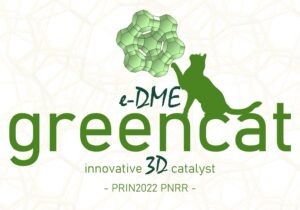PRIN P2022KA5ZZ_PE8_PRIN2022PNRR GREENCAT
CUP B53D23027080001 – PRR.PN024.019 – GAE P0000801
GREENCAT – GREEN fuels production via carbon dioxide hydrogenation over innovative CATalysts
Area tematica:
TECNOLOGIE PER LA PRODUZIONE E L’ACCUMULO DI IDROGENO, VETTORI ENERGETICI ECOCOMPATIBILI E PER IL RICICLO DELLA CO2
Responsabile: Dott. Giuseppe Bonura (giuseppe.bonura@cnr.it) Tel. 090624205 – BNRGPP78R04F158M
Fonte di Finanziamento: M.I.U.R. – P.R.I.N. Progetti di ricerca di interesse nazionale (PNRR) Finanziato dall’Unione Europea NextGenerationEU e Ministero dell’Università e della Ricerca
CLUSTER: 5. Climate, Energy and Mobility
Sub Cluster: 2. Clean and sustainable transition of the energy and transport sectors towards climate neutrality facilitated by innovative cross-sectoral solutions
Settore: PE8 – LINEA B – Sud
Titolo: GREEN fuels production via carbon dioxide hydrogenation over innovative CATalysts.
Acronimo: GREENCAT
numero/identificativo contratto attribuito dalla fonte di Finanziamento: Codice Progetto P2022KA5ZZ
CUP: B53D23027080001
Documento di Approvazione/Contract: D.D. n. 1207 del 28 luglio 2023
Il contributo di finanziamento implica la partecipazione a un bando o avviso: SI (Bando PRIN PNRR 2022 – Decreto Direttoriale n. 1409 del 14-9-2022)
Coordinatore: Università della Calabria – Dipartimento di Ingegneria dell’Ambiente – (DIAm) – Via Pietro Bucci, ARCAVACATA DI RENDE (CS) Prof. Enrico Catizzone CTZNRC89C12C352Y – enrico.catizzone@unical.it )
Altri Partner: Università di Napoli Federico II, C.so Umberto I, 40 – NAPOLI (NA) Prof. Raffaele Pastore PSTRFL82P26F839J (raffaele.pastore@unina.it) Tel. 0815796089
Parole chiave: heterogeneous catalysis; green fuels; sustainable chemistry; zeolites; molecular dynamics; CO2 conversion
Abstract:
The catalytic selective conversion of CO2 to fuels and chemicals is a key objective to address EU challenges of circularity and closing the carbon cycle in energy intensive industries, being among the main priorities in the EU Green Deal. In particular, the production of dimethyl ether (DME) represents a key strategy for the energy transition as it can be used as a green alternative fuel for diesel engine. The production of DME from fossils via methanol and its utilization as bulk chemical is currently at industrial scale, while its direct synthesis from CO2 via hydrogenation with green H2 still is at low TRL, especially in terms of catalyst development. Indeed, CO2 is a thermodynamically stable molecule with a very strong C=O bond, and its transformation into hydrocarbons or oxygenates requires an efficient catalyst. At this regard, the design of novel catalysts, with higher performances in terms of activity, selectivity and stability, is urgently needed to promote scientific advances and open new opportunities for industrial applications. Furthermore, detailed understanding and comprehension of transport phenomena during CO2 conversion in heterogeneous catalytic processes is still lacking. This is an important research objective since mastering activity, selectivity and realizing a single pot process from CO2 is a formidable techno-economic challenge from the application perspective. GREENCAT aims to address in a unifying vision and approach the concept of selective catalytic hydrogenation of CO2 to DME, by integrating and directly comparing expertise and research on CO2 conversion by heterogeneous catalysis and molecular dynamics simulations. The ambitious goal of GREENCAT is to offer a unique possibility to explore from a multifaced perspective the sustainability of the proposed technology over innovative hybrid catalysts, and to prepare the bases for more successful applications in EU projects able to unlock the scale-up and future potential market of CCU processes.The project proposes a different and more effective concept for knowledge integration. Rather than patching separate main activities, each focused on their specific sub-field, the project will use at the best the different multidisciplinary competences to explore new directions through a synergistic approach. The project involves 3 RU (University of Calabria – UNICAL; University of Naples Federico II – UNINA; the CNR Institute for Advanced Energy Technologies “N. Giordano” in Messina – CNR-ITAE), using 4 work packages (WPs) controlled by 10 milestones to accomplish scientific and technical objectives. WP1 is devoted to coordination and dissemination overwhelming the entire project; WP2 (UNICAL) relates to the development of novel catalysts; WP3 (UNINA) expands the fundamental understanding of the process mechanisms through modelling and assessment of transport phenomena; WP4 (CNR-ITAE) focuses on CO2-to-DME hydrogenation with structured catalysts and process intensification.
Costo totale: € 79.923,00 (CNR) + € 79.585,00 (UNICAL) + € 80.030,00 (UNINA)

